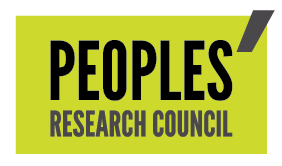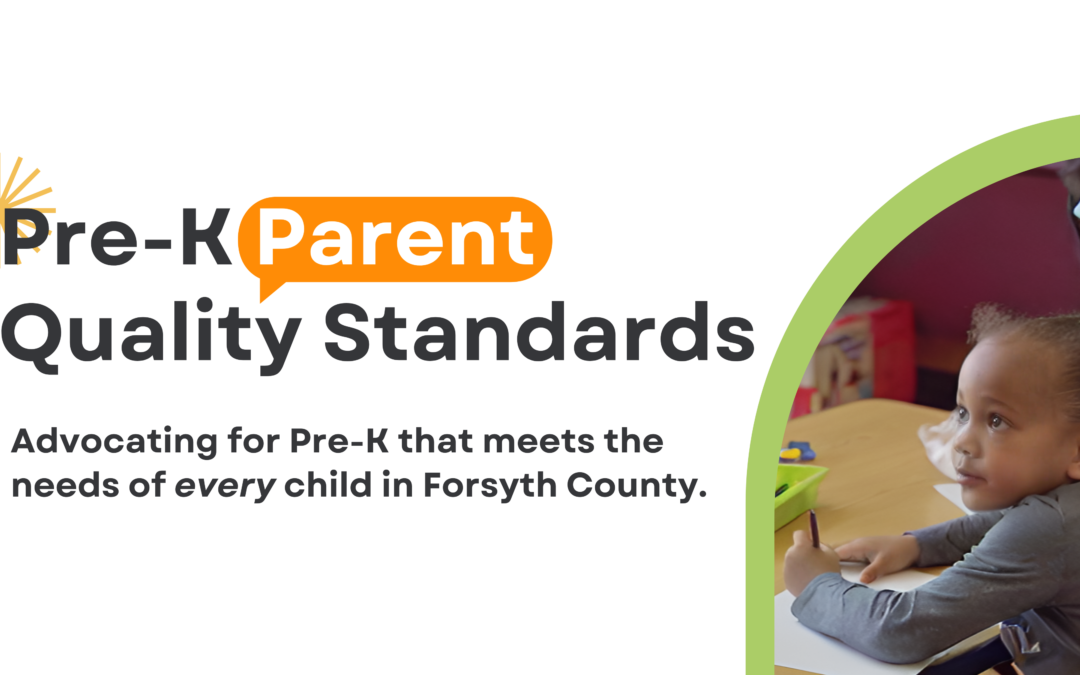This blog post is an update on the Pre-K Parent Quality Standards; a Peoples’ Research Council pilot project. For more information, click here.
Across the United States, and right here in Forsyth County, Black and Brown children often begin their educational journeys in Pre-K classrooms that are not reflective of their cultural backgrounds. These classrooms, staffed predominantly by white educators, present challenges in addition to the challenges of everyday learning. For Black and Brown children, adapting to an unfamiliar cultural environment while striving to achieve educational goals adds another layer of complexity to their early learning experiences.
A Blueprint for Change
In 2021, Forsyth Family Power (FFP) launched a project to amplify the voices of Black and Brown parents, families, and children in shaping a more equitable Pre-K system for Forsyth County. This initiative began with the training of four Black parents in Community-Based Participatory Research (CBPR).
These parent researchers gathered and analyzed data from Black and Latino families, leading to a comprehensive report and the following recommendations on the high-quality standards they envisioned for local Pre-K programs.
Read the first full report and learn more about the background of this project here.
1
Require early childhood educators to know and understand every child’s interests to help each child stay engaged while they are learning.
3
Develop curriculums and create learning environments where Black and Brown children are affirmed and can see themselves represented positively.
5
Develop a deep understanding of what it takes to build trusting relationships with children and to understand what is needed for that child to excel.
7
Eliminate barriers that prevent any 4-year-old in Forsyth County from gaining access to Pre-K services.
2
Create a culture within their program that motivates Black and Brown Pre-K children and instills confidence in their ability to learn.
4
Require educators to complete a multicultural education training to close the gap between communities and cultures embraced by Pre-K children and Pre-K providers.
6
Incorporate lessons about social justice so that children can begin to develop an understanding of the world in which they live.
8
Create an educational and organizational culture and environment that produces caring educators who are passionate about their work with Pre-K children.
Pathways to Implementation
The Pre-K Parent Quality Standards Project is now in its implementation phase, operating within the People’s Research Council (PRC) as one of its first pilot projects.
At the heart of this phase of the work is the Project Board, a dedicated group of Black and Brown parents of Pre-K aged children who play a crucial role in guiding the body of work, ensuring the recommendations are not only heard but acted upon. Board member bring valuable, firsthand experience as parents, and advocate for equitable and universal Pre-K education. Project Board members:
- Gwendolyn Farrow-Hughes
- Anthony Morris
- Victoria Hernandez
- Mark Smith
The work of the Project Board is deeply connected to two major local Pre-K initiatives: the Pre-K Priority and the ARPA Pre-K Initiative’s Equity Action Plan.
The Pre-K Priority is a coalition dedicated to expanding affordable, high-quality Pre-K programs for all four-year-olds in Forsyth County. Project Board members serve as community representatives on each of the Pre-K Priority work groups: Classroom/Student, Funding Advocacy, and Family/Equity.
Additionally, the Project Board collaborates closely with the American Rescue Plan Act (ARPA) Pre-K Initiative’s Equity Action Plan. This initiative, backed by a grant awarded to Smart Start of Forsyth County in 2022, supports approximately 30 Pre-K classrooms and educators, benefiting around 518 children across the county.
By aligning the Pre-K Parent Quality Standards Project with both the Pre-K Priority and ARPA initiatives, the board ensures that the recommendations from Black and Brown parents are integrated into local educational practices, fostering greater equity and inclusivity in early childhood education.

Contact Us
info@peoplesresearchcouncil.org
Transparency Statement on Spanish Translation
The Peoples’ Research Council is expanding our communication to include both English and Spanish, using AI-powered translation due to budget and capacity limits. This step reflects our commitment to equity & inclusion, ensuring our Spanish-speaking community members have access to our materials. While AI translations may not be perfect, we are dedicated to improving and we welcome your feedback. Your understanding and suggestions are valued as we strive to serve our community more equitably.
Declaración de Transparencia sobre la Traducción al Español
El Consejo de Investigación de la Gente está ampliando nuestra comunicación para incluir tanto inglés como español, utilizando traducción impulsada por inteligencia artificial debido a limitaciones de presupuesto y capacidad. Este paso refleja nuestro compromiso con la equidad, asegurando que los miembros de nuestra comunidad de habla hispana tengan acceso a nuestros materiales. Aunque las traducciones por IA pueden no ser perfectas, estamos dedicados a mejorarlas y agradecemos cualquier retroalimentación. Su comprensión y sugerencias son valoradas mientras nos esforzamos por servir a nuestra comunidad de manera más equitativa.
The Peoples’ Research Council is a partnership between Action4Equity, Forsyth Futures, and people who call Winston-Salem and Forsyth County, North Carolina home. It is made possible through financial support from the Kate B. Reynolds Charitable Trust.
© 2024 Peoples’ Research Council. All Rights Reserved.

